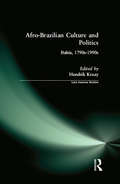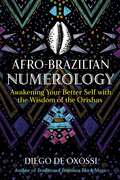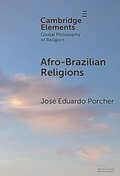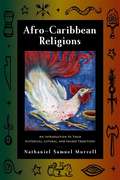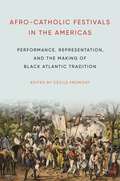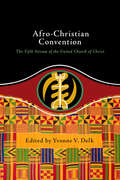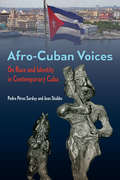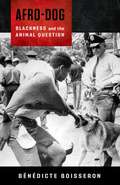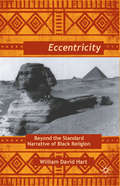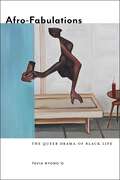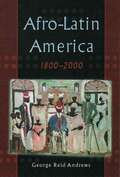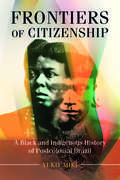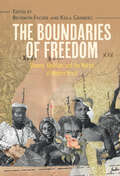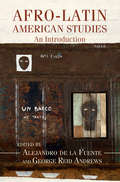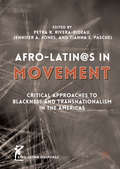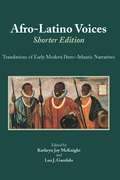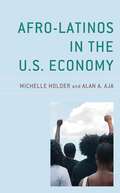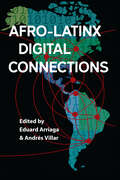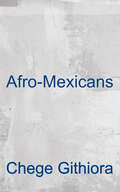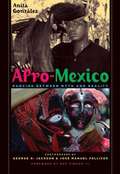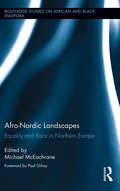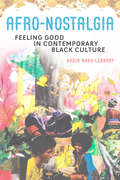- Table View
- List View
Afro-Brazilian Culture and Politics: Bahia, 1790s-1990s (Latin American Realities Ser.)
by Hendrik KraayThe essays in this book constitute an analytic survey of the last two centuries of Afro-Bahian history, with a focus squarely on the difficult relationship between Afro- and Euro-Bahia and on the continual Afro-Bahian struggle to create a meaningful culture in an environment either hostile or suffocating in its ability to absorb elements of Afro-Bahian culture.
Afro-Brazilian Numerology: Awakening Your Better Self with the Wisdom of the Orishas
by Diego de Oxóssi• Offers step-by-step instructions to calculate your Birth Odus and cast your full Orisha Birth Chart• Presents detailed interpretations of each of the 16 Birth Odus, showing how their energies manifest in an individual&’s personality, relationships, financial status, and general approach to life• Shares self-transformation techniques to help you improve the positive qualities of your chart while embracing, integrating, and neutralizing negative energies and tendenciesMuch like the celestial influences revealed by a natal astrology chart or the numerology of your birth date, African spiritual traditions believe that every person has specific personal energies ruling how we relate to each other and the way we foresee and achieve life goals. Called the birth Odus, these inner energies influence your choices and decisions throughout life, defining and differentiating you from everyone else--and revealing the best ways to maximize your potential and meet the challenges you face. Offering a complete guide to discovering, interpreting, and working with your birth Odus, Diego de Oxóssi details step by step how to calculate your birth Odus and cast your full Orisha birth Chart. He explains the Afro-Brazilian concept of numerology and its relationship with the 16 Odus and their related Orishas, the deities of the Afro-Brazilian spiritual tradition. He explores how to determine the influences in the major and minor houses of your Orisha birth chart, including those related to personality and identity, career and success, relationships and love, and challenges and personal evolution. Presenting case studies from his practice, the author offers detailed interpretations of each of the 16 birth Odus, showing how their energies manifest in an individual&’s life. He looks at the positive and negative aspects of each Odu, including how the negative aspects represent the shadow forces that one has to overcome to succeed in life. He offers self- transformation techniques to help you improve the positive qualities of your chart while embracing, integrating, and neutralizing the negative energies and tendencies. Revealing how to better know yourself and understand the spiritual dynamics behind your choices and behaviors, this guide shows you how to work with the energies of the Odus and the strength of the Orishas to improve your communication and relationship skills, overcome life&’s challenges, and ensure success and happiness on your life&’s path.
Afro-Brazilian Religions (Elements in Global Philosophy of Religion)
by José Eduardo PorcherThis Element introduces Afro-Brazilian religions and underscores the necessity for an expanded methodological framework to encompass these traditions in the philosophy of religion. It emphasizes the importance of incorporating overlooked sources like mythic narratives and ethnographies while acknowledging the pivotal role of material culture in cognitive processes. Furthermore, it advocates for adopting an embodiment paradigm to facilitate the development of a philosophy of religious practice. The Element illustrates this approach by examining phenomena often neglected in philosophical discussions on religion, such as sacrifice and spirit possession, and delves into the ontological commitments and implications of these practices. It also stresses the significance of employing thick descriptions and embracing interdisciplinary dialogue to cultivate a globally inclusive philosophy of religion, capable of engaging with phenomena frequently sidelined within the mainstream.
Afro-Caribbean Religions: An Introduction to Their Historical, Cultural, and Sacred Traditions
by Murrell Nathaniel SamuelReligion is one of the most important elements of Afro-Caribbean culture linking its people to their African past, from Haitian Vodou and Cuban Santeria—popular religions that have often been demonized in popular culture—to Rastafari in Jamaica and Orisha-Shango of Trinidad and Tobago. In Afro-Caribbean Religions, Nathaniel Samuel Murrell provides a comprehensive study that respectfully traces the social, historical, and political contexts of these religions. And, because Brazil has the largest African population in the world outside of Africa, and has historic ties to the Caribbean, Murrell includes a section on Candomble, Umbanda, Xango, and Batique. This accessibly written introduction to Afro-Caribbean religions examines the cultural traditions and transformations of all of the African-derived religions of the Caribbean along with their cosmology, beliefs, cultic structures, and ritual practices. Ideal for classroom use, Afro-Caribbean Religions also includes a glossary defining unfamiliar terms and identifying key figures.
Afro-Catholic Festivals in the Americas: Performance, Representation, and the Making of Black Atlantic Tradition (Africana Religions #2)
by Cécile FromontThis volume demonstrates how, from the beginning of the Atlantic slave trade, enslaved and free Africans in the Americas used Catholicism and Christian-derived celebrations as spaces for autonomous cultural expression, social organization, and political empowerment. Their appropriation of Catholic-based celebrations calls into question the long-held idea that Africans and their descendants in the diaspora either resignedly accepted Christianity or else transformed its religious rituals into syncretic objects of stealthy resistance.In cities and on plantations throughout the Americas, men and women of African birth or descent staged mock battles against heathens, elected Christian queens and kings with great pageantry, and gathered in festive rituals to express their devotion to saints. Many of these traditions endure in the twenty-first century. The contributors to this volume draw connections between these Afro-Catholic festivals—observed from North America to South America and the Caribbean—and their precedents in the early modern kingdom of Kongo, one of the main regions of origin of men and women enslaved in the New World. This transatlantic perspective offers a useful counterpoint to the Yoruba focus prevailing in studies of African diasporic religions and reveals how Kongo-infused Catholicism constituted a site for the formation of black Atlantic tradition.Afro-Catholic Festivals in the Americas complicates the notion of Christianity as a European tool of domination and enhances our comprehension of the formation and trajectory of black religious culture on the American continent. It will be of great interest to scholars of African diaspora, religion, Christianity, and performance.In addition to the editor, the contributors include Kevin Dawson, Jeroen Dewulf, Junia Ferreira Furtado, Michael Iyanaga, Dianne M. Stewart, Miguel A. Valerio, and Lisa Voigt.
Afro-Catholic Festivals in the Americas: Performance, Representation, and the Making of Black Atlantic Tradition (Africana Religions)
by Cécile FromontThis volume demonstrates how, from the beginning of the Atlantic slave trade, enslaved and free Africans in the Americas used Catholicism and Christian-derived celebrations as spaces for autonomous cultural expression, social organization, and political empowerment. Their appropriation of Catholic-based celebrations calls into question the long-held idea that Africans and their descendants in the diaspora either resignedly accepted Christianity or else transformed its religious rituals into syncretic objects of stealthy resistance.In cities and on plantations throughout the Americas, men and women of African birth or descent staged mock battles against heathens, elected Christian queens and kings with great pageantry, and gathered in festive rituals to express their devotion to saints. Many of these traditions endure in the twenty-first century. The contributors to this volume draw connections between these Afro-Catholic festivals—observed from North America to South America and the Caribbean—and their precedents in the early modern kingdom of Kongo, one of the main regions of origin of men and women enslaved in the New World. This transatlantic perspective offers a useful counterpoint to the Yoruba focus prevailing in studies of African diasporic religions and reveals how Kongo-infused Catholicism constituted a site for the formation of black Atlantic tradition.Afro-Catholic Festivals in the Americas complicates the notion of Christianity as a European tool of domination and enhances our comprehension of the formation and trajectory of black religious culture on the American continent. It will be of great interest to scholars of African diaspora, religion, Christianity, and performance.In addition to the editor, the contributors include Kevin Dawson, Jeroen Dewulf, Junia Ferreira Furtado, Michael Iyanaga, Dianne M. Stewart, Miguel A. Valerio, and Lisa Voigt.
Afro-Christian Convention: The Fifth Stream of the United Church of Christ
by Yvonne V. DelkThe story of the Afro-Christian Convention, one story of many in the history of the independent Black Church, is the story of faith, survival, affirmation, and empowerment in the hostile environment of racism. From 1892 to the 1960s, the Afro-Christian Convention was composed of 150 churches and 25,000 members, located primarily in North Carolina and Virginia. The tradition of the Afro-Christian church, too long ignored and under-celebrated, takes its rightful place in the canon of United Church of Christ history.
Afro-Cuban Voices: On Race and Identity in Contemporary Cuba (Contemporary Cuba)
by Jean Stubbs Pedro Pérez SarduyFrom the forewords: "At a time when Cuba is undergoing immense economic and social changes, race becomes a kind of cultural litmus test for the national identity. . . . This anthology illustrates fully that it is possible to be both revolutionary and black in Cuba."—Manning Marable, Columbia University "The authors of Afro-Cuban Voices, also key actors in the new, unfolding dialogue about race in Cuba, make a seminal contribution through a forthright critique of ‘racial blind spots’ in official history and present-day racial discrimination."—James Early, director of cultural studies and communication, Smithsonian Institution From the series editor: "A courageous attempt to deal head-on with the issue of race in Cuba today. . . . Pérez Sarduy and Stubbs [seek to] put a human face on this debate, and do so well. The book will be received with relief by some and with frustration by others. Controversial it will undoubtedly be, since—as with most things Cuban—strong emotions are a given assumption. It will be an admirable beginning for the series and, it is hoped, will spark a much-needed debate in the United States on many aspects of the ‘Cuban question.’ It is about time."—John M. Kirk Based on the vivid firsthand testimony of prominent Afro-Cubans who live in Cuba, this book of interviews looks at ways that race affects daily life on the island. While celebrating their racial and national identity, the collected voices express an urgent need to end the silences and distortions of history in both pre- and postrevolutionary Cuba. The 14 people interviewed—of different generations and from different geographic areas of Cuba—come from the arts, the media, industry, academia, and medicine. They include a doctor who calls for joint U.S.-Cuban studies on high blood pressure and a craftsman who makes the batá drums used in Yoruba worship ceremonies. All responded to four controversial questions: What is it like to be black in Cuba? How has the revolution made a difference? To what extent is that difference true today? What can be done? Exposing the contradictions of both racial stereotyping and cultural assimilation, their eloquent answers make the case that the issue of race in Cuba, no matter how hard to define, will not be ignored. A volume in the series Contemporary Cuba, edited by John M. Kirk
Afro-Dog: Blackness and the Animal Question
by Bénédicte BoisseronThe animal-rights organization PETA asked “Are Animals the New Slaves?” in a controversial 2005 fundraising campaign; that same year, after the Humane Society rescued pets in the aftermath of Hurricane Katrina while black residents were neglected, some declared that white America cares more about pets than black people. These are but two recent examples of a centuries-long history in which black life has been pitted against animal life. Does comparing human and animal suffering trivialize black pain, or might the intersections of racialization and animalization shed light on interlinked forms of oppression?In Afro-Dog, Bénédicte Boisseron investigates the relationship between race and the animal in the history and culture of the Americas and the black Atlantic, exposing a hegemonic system that compulsively links and opposes blackness and animality to measure the value of life. She analyzes the association between black civil disobedience and canine repression, a history that spans the era of slavery through the use of police dogs against protesters during the civil rights movement of the 1960s to today in places like Ferguson, Missouri. She also traces the lineage of blackness and the animal in Caribbean literature and struggles over minorities’ right to pet ownership alongside nuanced readings of Derrida and other French theorists. Drawing on recent debates on black lives and animal welfare, Afro-Dog reframes the fast-growing interest in human–animal relationships by positioning blackness as a focus of animal inquiry, opening new possibilities for animal studies and black studies to think side by side.
Afro-Eccentricity: Beyond the Standard Narrative of Black Religion
by William David HartAfro-Eccentricity explores three overlapping stories of Black Religion: the Soul, Black Church, and Ancestor Narratives. Hart contends that these narratives dominate most accounts of Black Religion that, collectively, he calls the "Standard Narrative of Black Religion. "
Afro-Fabulations: The Queer Drama of Black Life (Sexual Cultures #14)
by Tavia Nyong'oWinner, 2019 Barnard Hewitt Award for Outstanding Research in Theatre History, given by the American Society for Theatre ResearchHonorable Mention, 2021 Errol Hill Award, given by the American Society for Theatre ResearchArgues for a conception of black cultural life that exceeds post-blackness and conditions of loss In Afro-Fabulations: The Queer Drama of Black Life, cultural critic and historian Tavia Nyong’o surveys the conditions of contemporary black artistic production in the era of post-blackness. Moving fluidly between the insurgent art of the 1960’s and the intersectional activism of the present day, Afro-Fabulations challenges genealogies of blackness that ignore its creative capacity to exceed conditions of traumatic loss, social death, and archival erasure.If black survival in an anti-black world often feels like a race against time, Afro-Fabulations looks to the modes of memory and imagination through which a queer and black polytemporality is invented and sustained. Moving past the antirelational debates in queer theory, Nyong’o posits queerness as “angular sociality,” drawing upon queer of color critique in order to name the gate and rhythm of black social life as it moves in and out of step with itself. He takes up a broad range of sites of analysis, from speculative fiction to performance art, from artificial intelligence to Blaxploitation cinema. Reading the archive of violence and trauma against the grain, Afro-Fabulations summons the poetic powers of queer world-making that have always been immanent to the fight and play of black life.
Afro-Latin America, 1800-2000
by George Reid AndrewsWhile the rise and abolition of slavery and ongoing race relations are central themes of the history of the United States, the African diaspora actually had a far greater impact on Latin and Central America. More than ten times as many Africans came to Spanish and Portuguese America as the United States. <p><p>In this, the first history of the African diaspora in Latin America from emancipation to the present, George Reid Andrews deftly synthesizes the history of people of African descent in every Latin American country from Mexico and the Caribbean to Argentina. He examines how African peooples and their descendants made their way from slavery to freedom and how they helped shape and responded to political, economic, and cultural changes in their societies. Individually and collectively they pursued the goals of freedom, equality, and citizenship through military service, political parties, civic organizations, labor unions, religious activity, and other avenues. <p><p>Spanning two centuries, this tour de force should be read by anyone interested in Latin American history, the history of slavery, and the African diaspora, as well as the future of Latin America.
Afro-Latin America: A Black and Indigenous History of Postcolonial Brazil (Afro-Latin America)
by Yuko MikiFrontiers of Citizenship is an engagingly-written, innovative history of Brazil's black and indigenous people that redefines our understanding of slavery, citizenship, and the origins of Brazil's 'racial democracy'. Through groundbreaking archival research that brings the stories of slaves, Indians, and settlers to life, Yuko Miki challenges the widespread idea that Brazilian Indians 'disappeared' during the colonial era, paving the way for the birth of Latin America's largest black nation. Focusing on the postcolonial settlement of the Atlantic frontier and Rio de Janeiro, Miki argues that the exclusion and inequality of indigenous and African-descended people became embedded in the very construction of Brazil's remarkably inclusive nationhood. She demonstrates that to understand the full scope of central themes in Latin American history - race and national identity, unequal citizenship, popular politics, and slavery and abolition - one must engage the histories of both the African diaspora and the indigenous Americas.
Afro-Latin America: Black Lives, 1600-2000
by George Reid AndrewsOf the almost 11 million Africans who came to the Americas between 1500 and 1870, two-thirds came to Spanish America and Brazil. Over four centuries, Africans and their descendants—both free and enslaved—participated in the political, social, and cultural movements that indelibly shaped their countries’ colonial and post-independence pasts. Yet until very recently Afro-Latin Americans were conspicuously excluded from narratives of their hemisphere’s history.<P><P> George Reid Andrews seeks to redress this damaging omission by making visible the past and present lives and labors of black Latin Americans in their New World home. He cogently reconstructs the Afro-Latin heritage from the paper trail of slavery and freedom, from the testimonies of individual black men and women, from the writings of visiting African-Americans, and from the efforts of activists and scholars of the twentieth century to bring the Afro-Latin heritage fully into public view.<P> While most Latin American countries have acknowledged the legacy of slavery, the story still told throughout the region is one of “racial democracy”—the supposedly successful integration and acceptance of African descendants into society. From the 1970s to today, black civil rights movements have challenged that narrative and demanded that its promises of racial equality be made real. They have also called for fuller acknowledgment of Afro-Latin Americans’ centrality in their countries’ national histories. Afro-Latin America brings that story up to the present, examining debates currently taking place throughout the region on how best to achieve genuine racial equality.
Afro-Latin American Studies: An Introduction (Afro-latin America )
by George Reid Andrews Alejandro De La FuenteAlejandro de la Fuente and George Reid Andrews offer the first systematic, book-length survey of humanities and social science scholarship on the exciting field of Afro-Latin American studies. Organized by topic, these essays synthesize and present the current state of knowledge on a broad variety of topics, including Afro-Latin American music, religions, literature, art history, political thought, social movements, legal history, environmental history, and ideologies of racial inclusion.<P><P> This volume connects the region's long history of slavery to the major political, social, cultural, and economic developments of the last two centuries. Written by leading scholars in each of those topics, the volume provides an introduction to the field of Afro-Latin American studies that is not available from any other source and reflects the disciplinary and thematic richness of this emerging field.<P> Presents systematic and synthetic overviews of recent scholarship on topics of major importance in the field of Afro-Latin American studies, for example Afro-Latin American religions, Afro-Latin American political movements, and Afro-Latin American music. Covers a broad range of topics, embracing most of the humanities and social sciences.<P> Serves as the authoritative introduction for Afro-Latin American history, covering the period from 1500 to the present.<P>
Afro-Latin@s in Movement: Critical Approaches to Blackness and Transnationalism in the Americas (Afro-Latin@ Diasporas)
by Petra R. Rivera-Rideau Tianna S. Paschel Jennifer A. JonesThrough a collection of theoretically engaging and empirically grounded texts, this book examines African-descended populations in Latin America and Afro-Latin@s in the United States in order to explore questions of black identity and representation, transnationalism, and diaspora in the Americas.
Afro-Latino Voices: Narratives from the Early Modern Ibero-Atlantic World, 1550-1812
by Kathryn Joy Mcknight Leo J. GarofaloA landmark scholarly achievement . . . With judicious commentary by several of the leading experts in the field, this book dramatically expands the canon of texts used to study the black Atlantic and the African diaspora, and captures the tenor of the 'black voice' as it collectively engaged the power of colonial institutions. In no uncertain terms, Afro-Latino Voices will prove to be a remarkable pedagogical tool and an influential resource, inspiring deeper comparative work on the African diaspora. --Ben Vinson III, Center for Africana Studies, Johns Hopkins University
Afro-Latino Voices: Translations of Early Modern Ibero-Atlantic Narratives
by Leo J. Garofalo Kathryn Joy McKnightIdeally suited for use in broad, swift-moving surveys of Latin American and Caribbean history, this abridgment of McKnight and Garofalo's Afro-Latino Voices: Narratives from the Early Modern Ibero-Atlantic World, 1550-1812 (2009) includes all of the English translations, introductions, and annotation created for that volume.
Afro-Latinos in the U. S. Economy
by Michelle Holder Alan A. AjaAfro-Latinos in the U.S. Economy outlines the current position and status of Afro-Latinxs in the economy of the United States. Very little research has thus far been disseminated in the field of economics on the contributions of Afro-Latinxs regarding income and wealth, labor market status, occupational mobility, and educational attainment. On the other hand, cultural studies, literary criticism, and social science fields have produced more research on Afro-Latinxs; the discipline of economics is, thus, significantly behind the curve in exploring the economic dimensions of this group. <p><p>While the Afro-Latinx community constitutes a comparatively small segment of the U.S. population, and is often viewed as the nexus between two of the country’s largest minority groups—African Americans and Latinxs, who comprise 13 percent and 17 percent, respectively, of the U.S. population—Holder and Aja outline how the group’s unique economic position is different than non-black Latinxs. Despite possessing higher levels of education relative to the Latinx community as a whole, U.S. Afro-Latinxs do not experience expected returns in income and earnings, underscoring the role anti-Blackness plays in everyday life regardless of ancestral origin. <p><p>The goal of this book is to provide a foundation in the economic dimensions of Afro-Latinxs in the U.S. which can be used to both complement and supplement research conducted on this group in other major disciplines.
Afro-Latinx Digital Connections (Reframing Media, Technology, and Culture in Latin/o America)
by Eduard Arriaga Andrés VillarHow Black Latinx communities are using digital technology to achieve visibility and social justice This volume presents examples of how digital technologies are being used by people of African descent in South America and the Caribbean, a topic that has been overlooked within the field of digital humanities. These case studies show that in the last few decades, Black Latinx communities have been making themselves visible and asserting long-standing claims and rights through digital tools and platforms, which have been essential for enacting discussions and creating new connections between diverse groups. Afro-Latinx Digital Connections includes both research articles and interviews with practitioners who are working to create opportunities for marginalized communities. Projects discussed in this volume range from an Afrodescendant digital archive in Argentina, blog networks in Cuba, an NGO dedicated to democratizing technology in Brazilian favelas, and the recruitment of digital media to fight racism in Peru. Contributors demonstrate that these tools need not be state of the art to be effective and that they are often most useful when employed to sustain a resilience that is deep and historically grounded. Digital connections are shown here as a means to achieve social justice and to create complex self-representations that challenge racist images of Afrodescendant peoples and monolithic conceptions of humanity. This volume expands the scope of digital humanities and challenges views of the field as a predominantly white discipline. Contributors: Sandra AbdAllah-Álvarez | Adebayo Adegbembo | Maya Anderson-González | Eduard Arriaga | Silvana Bahia | Yvonne Captain | Monica Carrillo | Yancy Castillo | Alí Majul | Maria Cecilia Martino | Andrés Villar A volume in the series Reframing Media, Technology, and Culture in Latin/o America, edited by Héctor Fernández L’Hoeste and Juan Carlos Rodríguez
Afro-Mexicans: Discourse of Race and Identity on the African Diaspora
by Chege GithoriaMy fascinating journey among Afro-Mexicans began when I was a student in Mexico City. My personal background had shaped in me a consciousness about African people dispersed in all continents, but because of the language barrier, my conceptualization of their journey of migration and survival, linguistic and sociocultural continuities was limited to African Diaspora experiences of Anglo-North America and the Caribbean, perhaps one or two translations from the French Caribbean experience, but nothing of the Hispanic Diaspora. This pervasive effect of the linguistic spheres carved by the different European powers in their colonization of Africa, Asia, and the Americas must, I con¬cluded, be appreciated in full.
Afro-Mexico: Dancing Between Myth and Reality
by Anita GonzálezWhile Africans and their descendants have lived in Mexico for centuries, many Afro-Mexicans do not consider themselves to be either black or African. For almost a century, Mexico has promoted an ideal of its citizens as having a combination of indigenous and European ancestry. This obscures the presence of African, Asian, and other populations that have contributed to the growth of the nation. However, performance studies--of dance, music, and theatrical events--reveal the influence of African people and their cultural productions on Mexican society. In this work, Anita Gonzalez articulates African ethnicity and artistry within the broader panorama of Mexican culture by featuring dance events that are performed either by Afro-Mexicans or by other ethnic Mexican groups about Afro-Mexicans. She illustrates how dance reflects upon social histories and relationships and documents how residents of some sectors of Mexico construct their histories through performance. Festival dances and, sometimes, professional staged dances point to a continuing negotiation among Native American, Spanish, African, and other ethnic identities within the evolving nation of Mexico. These performances embody the mobile histories of ethnic encounters because each dance includes a spectrum of characters based upon local situations and historical memories.
Afro-Nordic Landscapes: Equality and Race in Northern Europe (Routledge Studies on African and Black Diaspora)
by Michael McEachraneAfro-Nordic Landscapes: Equality and Race in Northern Europe challenges a view of Nordic societies as homogenously white, and as human rights champions that are so progressive that even the concept of race is deemed irrelevant to their societies. The book places African Diasporas, race and legacies of imperialism squarely in a Nordic context. How has a nation as peripheral as Iceland been shaped by an identity of being white? How do Black Norwegians challenge racially conscribed views of Norwegian nationhood? What does the history of jazz in Denmark say about the relation between its national identity and race? What is it like to be a mixed-race black Swedish woman? How have African Diasporans in Finland navigated issues of race and belonging? And what does the widespread denial of everyday racism in Nordic societies mean to Afro-Nordics? This text is a must read for anyone interested in issues of race in the Nordic region and Europe writ large. As Paul Gilroy writes in his foreword, it is a book that "should be studied with care and profit inside the Nordic countries and also outside them by the broader international readership that has been established around the study of racism and 'critical race theory'."
Afro-Nostalgia: Feeling Good in Contemporary Black Culture (New Black Studies Series #1)
by Badia Ahad-LegardyThe past as a building block of a more affirming and hopeful future As early as the eighteenth century, white Americans and Europeans believed that people of African descent could not experience nostalgia. As a result, black lives have been predominately narrated through historical scenes of slavery and oppression. This phenomenon created a missing archive of romantic historical memories. Badia Ahad-Legardy mines literature, visual culture, performance, and culinary arts to form an archive of black historical joy for use by the African-descended. Her analysis reveals how contemporary black artists find more than trauma and subjugation within the historical past. Drawing on contemporary African American culture and recent psychological studies, Ahad-Legardy reveals nostalgia’s capacity to produce positive emotions. Afro-nostalgia emerges as an expression of black romantic recollection that creates and inspires good feelings even within our darkest moments. Original and provocative, Afro-Nostalgia offers black historical pleasure as a remedy to contend with the disillusionment of the present and the traumas of the past.
